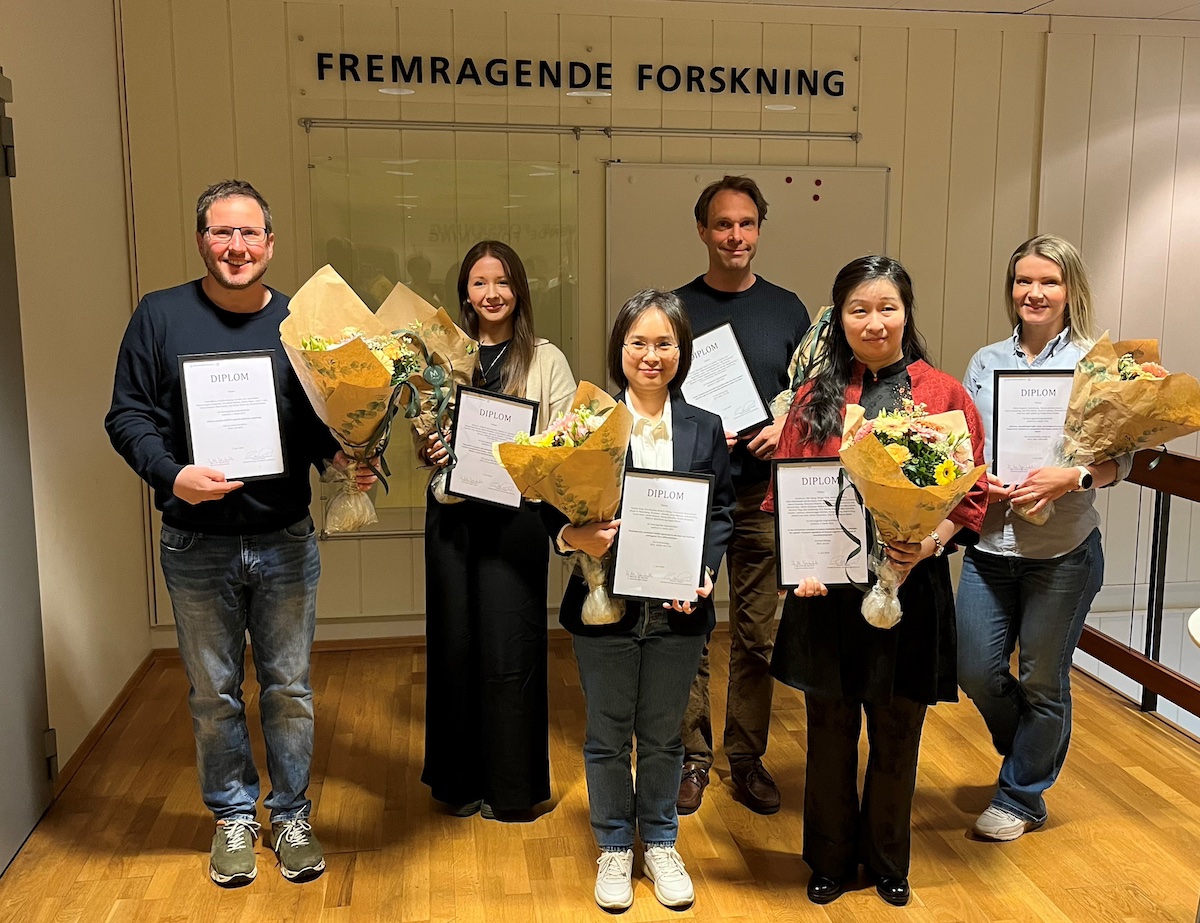Oslo University Hospital has awarded 6 excellent articles for the second half-year of 2023
In order to stimulate excellent research and draw attention to the hospital's research activity, Oslo University Hospital rewards outstanding publications every half-year.
Six research groups were awarded for their excellent papers published the second half-year of 2023 during a ceremony on June 7th. Each group received NOK 50.000 earmarked for further research, and the prize winners gave short presentations of their main findings.
The awards for outstanding research articles are distributed twice a year based on more than 2,400 scientific articles published annually by OUH. It is the research committees in the hospital divisions that nominate the articles. An external committee evaluates the nominated articles, and finally selects the six worthy winners. The winning articles must have achieved international impact or excelled in other ways. It is also required that the articles maintain a particularly high quality and communicate important findings.

Research director Erlend Smeland was responsible for the distribution and says:
- Among the winners of this award we find new knowledge about the spread of treatment-resistant bacteria, the connection between delirium and brain damage, genetic risk factors for cluster headaches, a hereditary mutation with implications for bile duct inflammation, a new biological mechanism behind selective autophagy as well as modeling of brain development using organid cultures . The winning articles show that researchers at OUS make important contributions to the understanding of processes in disease development and that they are key drivers in international research collaboration.
The winning articles show that OUS makes important contributions to the understanding of processes in disease development and improved diagnosis and treatment, says research director Erlend Smeland, who led the ceremony.
News article, including popular science summaries of the findings and the committee's statements:
(in Norwegian)
Priser til fremragende forskningsartikler publisert høsten 2023 (www.oslo-universitetssykehus.no)
Award-winning articles, second half-year of 2023
Difficult-to-treat isolates of the Klebsiella bacterium occur mainly in hospital environments, also in low-income countries
- Jessica Calland et al.
Population structure and antimicrobial resistance among Klebsiellaisolates sampled from human, animal, and environmental sources in Ghana: a cross-sectional genomic One Health study
Jessica K. Calland, Kaisa Haukka, Stephen W. Kpordze, Atanyiwoen Brusah, Marta Corbella, Cristina Merla, Ørjan Samuelsen, Edward J. Feil, Davide Sassera, Akosua B. Karikari, Courage K. S. Saba, Harry A. Thorpe, Jukka Corander
The Lancet Microbe https://doi.org/10.1016/S2666-5247(23)00208-2
Delirium may cause accelerated cognitive impairment and damage to the brain
- Maria Krogseth et al.
Delirium, neurofilament light chain, and progressive cognitive impairment: analysis of a prospective Norwegian population-based cohort
Maria Krogseth, Daniel Davis, Thomas Andrew Jackson, Henrik Zetterberg, Leiv Otto Watne, Morten Lindberg, Petronella Chitalu, Alex Tsui, Geir Selbæk, Torgeir Bruun Wyller
The Lancet Healthy Longevity https://doi.org/10.1016/S2666-7568(23)00098-3
A genetic basis for cluster headache
- Bendik S. Winsvold et al.
Cluster headache genomewide association study and meta-analysis identifies eight loci and implicates smoking as causal risk factor
Bendik S. Winsvold, Aster V. E. Harder, Caroline Ran, Mona A. Chalmer, Maria Carolina Dalmasso, Egil Ferkingstad, Kumar Parijat Tripathi, Elena Bacchelli, Sigrid Børte, Carmen Fourier, Anja S. Petersen, Lisanne S. Vijfhuizen, Sigurdur H. Magnusson, Emer O’Connor, Gyda Bjornsdottir, Paavo Häppölä, Yen-Feng Wang, Ida Callesen, Tim Kelderman, Victor J Gallardo, Irene de Boer, Felicia Jennysdotter Olofsgård, Katja Heinze, Nunu Lund,Laurent F. Thomas, Chia-Lin Hsu, Matti Pirinen, Heidi Hautakangas, Marta Ribasés, Simona Guerzoni, Prasanth Sivakumar, Janice Yip, Axel Heinze, Fahri Küçükali, Sisse R. Ostrowski, Ole B. Pedersen, Espen S. Kristoffersen, Amy E. Martinsen, María S. Artigas, Susie Lagrata, Maria Michela Cainazzo, Joycee Adebimpe, Olivia Quinn, Carl Göbel, Anna Cirkel, Alexander E. Volk, Stefanie Heilmann-Heimbach, Anne Heidi Skogholt, Maiken E. Gabrielsen, Leopoldine A. Wilbrink, Daisuke Danno, Dwij Mehta, Daníel F. Guðbjartsson, HUNT All-In Headache, The International Headache Genetics Consortium, DBDS Genomic Consortium, Frits R. Rosendaal, Ko Willems van Dijk, Rolf Fronczek, Michael Wagner, Martin Scherer, Hartmut Göbel, Kristel Sleegers, Olafur A. Sveinsson, Luca Pani, Michele Zoli, Josep A. Ramos-Quiroga, Efthimios Dardiotis, Anna Steinberg, Steffi Riedel-Heller, Christina Sjöstrand, Thorgeir E. Thorgeirsson, Hreinn Stefansson, Laura Southgate, Richard C. Trembath, Jana Vandrovcova, Raymond Noordam, Koen Paemeleire, Kari Stefansson, Cathy Shen-Jang Fann, Elisabet Waldenlind, Erling Tronvik, Rigmor H. Jensen, Shih-Pin Chen, Henry Houlden, Gisela M. Terwindt, Christian Kubisch, Elena Maestrini, Michail Vikelis, Patricia Pozo-Rosich, Andrea C. Belin, Manjit Matharu, Arn M.J.M. van den Maagdenberg, Thomas F. Hansen, Alfredo Ramirez, and John-Anker Zwart for the International Consortium for Cluster Headache Genetics
Annals of Neurology https://doi.org/10.1002/ana.26743
Local interaction between bile duct cells and T cells is a general mechanism behind bile duct inflammation
- Xiaojun Jiang et al.
Cholangiocytes modulate CD100 expression in the liver and facilitate pathogenic Th17 differentiation
Xiaojun Jiang, Kari Otterdal, Brian K. Chung, Christopher Maucourant, Jørgen D. Rønneberg, Christine L. Zimmer, Jonas Øgaard, Yuliia Boichuk, Sverre Holm, Daniel Geanon, Georg Schneditz, Annika Bergquist, Niklas K. Björkström, Espen Melum
Gastroenterology https://doi.org/10.1053/j.gastro.2023.11.283
Selective autophagy is controlled by the ATPase activity of DFCP1
- Viola Nähse et al.
ATPase activity of DFCP1 controls selective autophagy
Viola Nähse, Camilla Raiborg, Kia Wee Tan, Sissel Mørk, Maria Lyngaas Torgersen, Eva Maria Wenzel, Mireia Nager, Veijo T. Salo, Terje Johansen, Elina Ikonen, Kay Oliver Schink, Harald Stenmark
Nature Communications https://doi.org/10.1038/s41467-023-39641-9
Modeling of OXR1 activity in brain organoids shows an association with epilepsy, developmental delays and cognitive disabilities
- Xiaolin Lin et al.
A loss-of-function mutation in human Oxidation Resistance 1 disrupts the spatial– temporal regulation of histone arginine methylation in neurodevelopment
Xiaolin Lin, Wei Wang, Mingyi Yang, Nadirah Damseh, Mirta Mittelstedt Leal de Sousa, Fadi Jacob, Anna Lång, Elise Kristiansen, Marco Pannone, Miroslava Kissova, Runar Almaas, Anna Kuśnierczyk, Richard Siller, Maher Shahrour, Motee Al‑Ashhab, Bassam Abu‑Libdeh, Wannan Tang, Geir Slupphaug, Orly Elpeleg, Stig Ove Bøe, Lars Eide, Gareth J. Sullivan, Johanne Egge Rinholm, Hongjun Song, Guo‑li Ming, Barbara van Loon, Simon Edvardson, Jing Ye, Magnar Bjørås
Genome Biology https://doi.org/10.1186/s13059-023-03037-1
